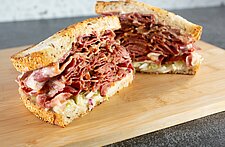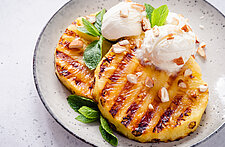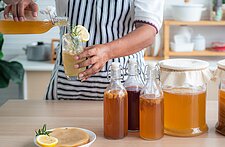There was a time when “Texas fine foods” was an oxymoron – like “military intelligence” and “Microsoft Works.” Those days are long gone, especially in Central Texas, where the explosion in population and business innovation have brought a concomitant upgrade in the sophistication of the restaurant scene. At the recent StarChefs Rising Star Awards for Austin and San Antonio – returning to Central Texas after only 5 years – creativity and flavor hit new highs as the honored chefs and mixologists demonstrated the innovative dishes that have put them on the A-list.
A highlight of the two-day tasting was the Symrise-sponsored round-table discussion of chef-driven trends, flavors, and inspiration. Chef-owners Kevin Fink of Emmer & Rye, Michael Fojtasek of Olamaie, and Max Snyder of Pitchfork Pretty traded thoughts and approaches with pastry chef Daniela Herrera (Counter 3. Five. VII.) and mixologist Madelyn Kay (VOX Table). Rounding out the sixsome was Philip Speer, who, as a pastry chef at Uchi, snagged a Rising Star Award in 2012, and is now a chef-owner at Bonhomie.
Reflecting the youth and energy of the Central Texas scene, the chefs had a remarkably consistent approach to their craft that can best be described as “fun.” Experimentation is rampant, whimsy shows up in every course, and challenges are embraced as a means to an end.
Related: A Year of Culinary Innovation: Best of Symrise Roundtable Discussions
We asked the chefs, what inspires you? And the answers often had to do with a memory or experience. A chef’s inspiration, according to Speer is, “I like the idea of focusing on a single ingredient and remembering what types of techniques I’ve used with it before to figure out what new thing I might do,” he said. “It’s like method acting — I draw on other types of memories that relate to it and think about what deliciousness is missing.” He recalled packing his daughter’s lunch for school and recognizing the possibilities of a dessert that used all the same elements – PB&J, raisins, and chips. But at Uchi, the dish needed an Asian element, so he added wasabi for heat to cut the sweetness.
Fojtasek concurred. “I’ll get inspired standing over a cutting board or at the market. I picture the way an ingredient was used in the past and what we might do that would bring it into the present. Like my mother’s broccoli-rice casserole, which was made mostly from canned goods – I want to think how it would work with fresh foods.”
“Limitations of any kind can be inspirational,” added Snyder. “Our garden is our single source, so what’s there that we can use, and what can we add to make it memorable?”
Originally trained as an artist and sculptor, Herrera often finds inspiration in a painting or piece of sculpture. “I’m very visual,” she says, “but I want my desserts to be approachable, enjoyable. So I try to translate the art into an experience.”
Kay’s favorite resource is The Flavor Bible. “I use it to develop unique flavor combinations. Like tequila with burrata. I had melon syrup, and because it combines classically with burrata, I fat-washed the tequila with the burrata before I combined the two liquids.”
Collaboration is critical to inspiration. Says Herrera, “I want my dishes to be in sync with the rest of the menu. Sometimes you have to think outside the box, and use what’s available, as if the menu is technique-driven.” “Pastry chefs are always collaborating,” added Speer. “It’s good to get a different view.”
“I ask servers, wives, cooks, friends,” says Snyder. “Other perspectives often spark ideas.” Fink concurred. “It’s good to have balance in the sources of our ideas,” he said. “I start with an ingredient and get help in the problem-solving stage.”
One thing they’ve all learned: Failure is an important option. From Fojtasek: “Sometimes failure creates an opportunity in another direction, or informs another decision.”
Snyder agreed. “If a dish isn’t working, look at the science to see why. If it worked the same way the first three times you try it, and the fourth time it’s different, think of all the variables and what might have changed. Learning creates a new experience.”
“Failure is a big part of success,” said Herrera, “though it’s hard because of all the time you invest in developing a dish.” Fink added, “We’ll often work a dish 3-4 times before it hits the menu, but if we can’t consistently take it all the way, it comes off. You can’t be afraid to fail.”
Come back next week to find out what these extraordinarily talented folks say are among their favorite ingredients today.
Subscribe to our weekly in-sight newsletter for more food and consumer trends!





